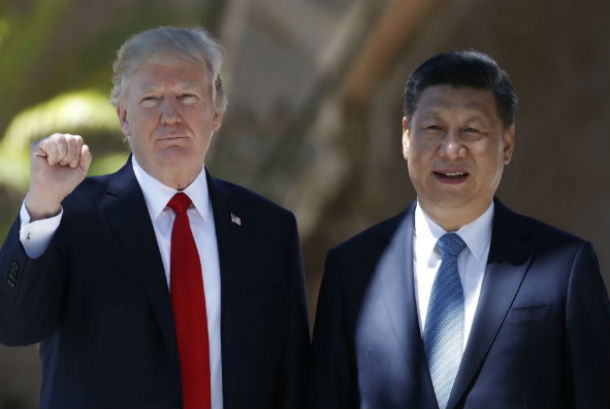 Washington DC — The first meeting between U.S. President Donald Trump and his Chinese counterpart, Xi Jinping ended without the release of any joint statement summarizing the outcome. But, Trump declares "tremendous progress" while Xi said it was "positive and fruitful."
Washington DC — The first meeting between U.S. President Donald Trump and his Chinese counterpart, Xi Jinping ended without the release of any joint statement summarizing the outcome. But, Trump declares "tremendous progress" while Xi said it was "positive and fruitful."
The summit between US and China held on April 6 and 7, 2017, in the United States, "ended without any detailed announcement of the outcome", the International Campaign for Tibet said in a statement.
The two leaders agreed that their first meeting, held at the seaside Mar-a-Lago resort in the U.S. state of Florida was "positive and fruitful," according to Chinese state-controlled media Xinhua. "During their talks over the past two days, Xi and Trump exchanged their views on key areas of bilateral cooperation as well as global and regional issues of common concern."
Xi said his first meeting with the U.S. leader bears unique importance to the development of China-U.S. ties,' the Chinese state-media reported. The Chinese leader also said that they, during the meeting, have also gained better understanding of each other, stepped up their mutual trust, scored multiple major consensus, and built up a good working relationship.
Addressing the media briefly between meetings, President Trump said, "I think we have made tremendous progress in our relationship with China" but no specifics were given. President Xi Jinping said, "(W)e have further built up understanding and established a kind of trust, and we have initially built up a working relationship and friendship."
Following the summit, and in response to a question from the media on whether the Administration had spoken to the Chinese on human rights violations, Secretary of State Rex Tillerson said: "As to the discussions around human rights in China, I think America's values are quite clear and they really occupied a core of all of our discussions. I don't think you have to have a separate conversation, somehow separate our core values around human rights from our economic discussions, our military-to-military discussions, or our foreign policy discussions. They're really embedded in every discussion, that that is really what guides much of our view around how we're going to work together."
"The International Campaign for Tibet will be closely monitoring the United States interaction with the Chinese government to see if the obligations established by the Tibetan Policy Act of 2002 will be implemented," said ICT President Matteo Mecacci. "We are all for wholesome US engagement with China, but it will be betrayal of America's interests if we abandon the fundamental values of freedom, human rights, and democratic governance," Mecacci added.
The Tibetan Policy Act of 2002 is the core legislative measure guiding U.S. policy toward Tibet and mandates that the Administration "support the aspirations of the Tibetan people to safeguard their distinct identity."
The Tibetan Policy Act also calls for the appointment of a US Special Coordinator for Tibetan Issues, whose responsibilities include the promotion of dialogue between the Dalai Lama's envoys and the Chinese leadership and "pressing for improved respect for human rights". The State Department has yet to see the nomination and appointment of Deputy Secretaries and Under Secretaries, one of whom could be designate the Special Coordinator on Tibet.
Since President Donald Trump's assumption of the presidency in January 2017 and the beginning of the new session of Congress, members of Congress have been clear in conveying their continued support to the Dalai Lama and the Tibetan people in their quest to find a mutually beneficial solution for the future of Tibet. In addition to bi-partisan letters written to the Administration, including one by Leader Nancy Pelosi, a bipartisan and bicameral bill on Reciprocal Access to Tibet has been introduced by Representatives Jim McGovern and Randy Hultgren in the House and Senators Marco Rubio and Tammy Baldwin in the Senate.
In 2014, US urged the Chinese government to resume dialogue with the Dalai Lama or his representatives without pre-conditions as a means to reduce tensions. To encourage those talks, U.S. State Department had named Dr Sarah Sewall, as a special coordinator for Tibet Issues.
"The Chinese government resolutely opposes any foreign country using the so-called Tibet problem to interfere in China's internal affairs," said Hua Chunying who was that time Chinese Foreign Ministry spokeswoman.
"China has never and will never recognize the U.S.' so-called special envoy for the Tibet problem," Chunying said, talking to the media after Dr Sewall being appointed to the top post, handling of the Tibet issues at the White House.
Chinese communist government says Tibet has always been part of its territory, but Tibetans say Tibet had always been an independent nation untill Chinese communist regime occupied it by forcibly, starting in 1940s.
Tibet was invaded by Communist China in 1949. Since that time, over 1.2 million out of 6 million Tibetans have been killed, over 6000 monasteries have been destroyed and acts of murder, rape, arbitrary imprisonment, torture and cruel, inhuman and degrading treatment were inflicted on the Tibetans inside Tibet. Beijing continues to call this a "peaceful liberation".


![Tibet has a rich history as a sovereign nation until the 1950s when it was invaded by China. [Photo: File]](/images/stories/Pics-2024/March/Tibet-Nation-1940s.jpg#joomlaImage://local-images/stories/Pics-2024/March/Tibet-Nation-1940s.jpg?width=1489&height=878)















